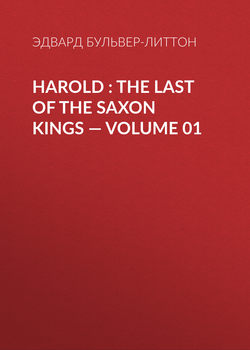Harold : the Last of the Saxon Kings — Volume 01

Реклама. ООО «ЛитРес», ИНН: 7719571260.
Оглавление
Эдвард Бульвер-Литтон. Harold : the Last of the Saxon Kings — Volume 01
DEDICATORY EPISTLE
PREFACE TO THE THIRD EDITION
BOOK I. THE NORMAN VISITOR, THE SAXON KING, AND THE DANISH PROPHETESS
CHAPTER I
CHAPTER II
CHAPTER III
CHAPTER IV
CHAPTER V
NOTES
NOTE (A)
NOTE (B)
NOTE (C)
NOTE (D)
NOTE (E)
NOTE (F)
NOTE (G)
NOTE (H)
NOTE (I)
NOTE (K)
NOTE (L)
NOTE (M)
NOTE (N)
NOTE (O)
NOTE (P)
NOTE (Q)
NOTE (R)
Отрывок из книги
The author of an able and learned article on MABILLON6 in the "Edinburgh Review," has accurately described my aim in this work; although, with that generous courtesy which characterises the true scholar, in referring to the labours of a contemporary, he has overrated my success. It was indeed my aim "to solve the problem how to produce the greatest amount of dramatic effect at the least expense of historical truth"—I borrow the words of the Reviewer, since none other could so tersely express my design, or so clearly account for the leading characteristics in its conduct and completion.
There are two ways of employing the materials of History in the service of Romance: the one consists in lending to ideal personages, and to an imaginary fable, the additional interest to be derived from historical groupings: the other, in extracting the main interest of romantic narrative from History itself. Those who adopt the former mode are at liberty to exclude all that does not contribute to theatrical effect or picturesque composition; their fidelity to the period they select is towards the manners and costume, not towards the precise order of events, the moral causes from which the events proceeded, and the physical agencies by which they were influenced and controlled. The plan thus adopted is unquestionably the more popular and attractive, and, being favoured by the most illustrious writers of historical romance, there is presumptive reason for supposing it to be also that which is the more agreeable to the art of fiction.
.....
It is stated in the Athenaeum, and, I believe, by a writer whose authority on the merits of opera singers I am far from contesting but of whose competence to instruct the world in any other department of human industry or knowledge I am less persuaded, "that I am much mistaken when I represent not merely the clergy but the young soldiers and courtiers of the reign of the Confessor, as well acquainted with the literature of Greece and Rome."
The remark, to say the least of it, is disingenuous. I have done no such thing. This general animadversion is only justified by a reference to the pedantry of the Norman Mallet de Graville—and it is expressly stated in the text that Mallet de Graville was originally intended for the Church, and that it was the peculiarity of his literary information, rare in a soldier (but for which his earlier studies for the ecclesiastical calling readily account, at a time when the Norman convent of Bec was already so famous for the erudition of its teachers, and the number of its scholars,) that attracted towards him the notice of Lanfranc, and founded his fortunes. Pedantry is made one of his characteristics (as it generally was the characteristic of any man with some pretensions to scholarship, in the earlier ages;) and if he indulges in a classical allusion, whether in taunting a courtier or conversing with a "Saxon from the wealds of Kent," it is no more out of keeping with the pedantry ascribed to him, than it is unnatural in Dominie Sampson to rail at Meg Merrilies in Latin, or James the First to examine a young courtier in the same unfamiliar language. Nor should the critic in question, when inviting his readers to condemn me for making Mallet de Graville quote Horace, have omitted to state that de Graville expressly laments that he had never read, nor could even procure, a copy of the Roman poet—judging only of the merits of Horace by an extract in some monkish author, who was equally likely to have picked up his quotation second-hand.
.....